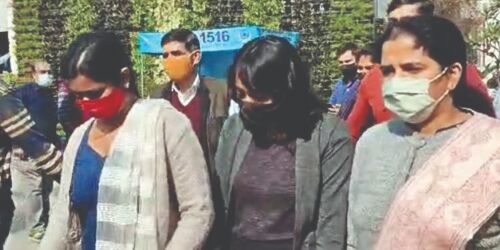From Kapil Mishra's campaign against interfaith marriage to campaigns promoting Ujjwala scheme

New Delhi: As a 22-year-old climate activist, a Mumbai-based lawyer and a Pune-based engineer try to understand how they became part of a sedition case by trying to organise online support for a particular cause — through a toolkit — it is important to note that the document does not mention violence or any incitement to violence. It called for supporters of the cause to tweet messages at the same time so that an issue could get some time on a public platform.
To contextualise how usual the practice of creating and using toolkits to mobilise online support for a cause, one need not go further than causes that are aligned with the Central government's position on policies. From a group known as the "Hindu Ecosystem" created by BJP leader Kapil Mishra's campaign against interfaith marriages to drumming up support for govt policies such as the Ujjwala scheme and the Demonetisation move.
For starters, Mishra had in November last year posted a message seeking membership for the "Hindu Ecosystem". Following this membership drive, members received links to join Telegram group chats, where regularly such toolkits were shared, according to a Newslaundry report.
The report went on to mention that multiple Twitter campaigns were run through this Telegram group for many campaigns such as ones supporting the contentious CAA legislation and ones that called for the restoration of human rights for Hindus with hashtags such as #NoHumanRights4Hindus.
In addition to this, publicly available fact-checks of tweets from Alt-News showed that several campaigns were run to drum up online support for policies such as Demonetisation and the Ujjwala scheme.
In a 2018 fact-check, it was found that a Tweetstorm was organised to amplify the message of the Ujjwala Scheme reaching its target of 5 crore cylinders eight months ahead of time. It was revealed that BJP leader Amit Malviya had shared a toolkit on Google docs similar to the one for which Disha Ravi has been arrested. It had timings for the tweets and sample tweets for people to choose from.
Moreover, another group that has found common use of the toolkit is the one seeking "justice" for Sushant Singh Rajput's death. Even as recently as Sunday, some of the Twitter accounts active for tweeting such content had tweeted information of a Twitterstorm ahead of the judgement that came in favour of Rhea Chakravarty on Monday.
Several such campaigns are normal and natural processes of any movement designed to organise online support for a cause. In fact, it is also a common way to mobilise online support before elections. According to an interview with Millennium Post before the 2020 Delhi Assembly elections, the then social media chief of the Delhi unit of the BJP had said that they were also designing social media campaigns that would use similar tools. He had maintained that the campaigns would be organic but coordinated to gain traction for a particular cause.
In addition to this, the commonality of social media toolkits can be observed in how almost every organisation working for any social or political or economic cause uses similar campaigns regularly to gain traction on public platforms.
In another example of such a toolkit being used for campaigns in support of the Central government's policies, after an adverse report from the then Reserve Bank of India, a similar toolkit with suggestions for hashtags and sample tweets was shared with government functionaries, whose accounts then tweeted these messages. Hashtags such as #DemonetisationSuccess were among the ones used.
When asked by reporters as to what was criminal about the toolkit that Disha Ravi shared, the police said it was created in conspiracy with "pro-Khalistani" elements and had "secessionist" content embedded through links.



